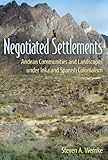Negotiated Settlements : Andean Communities and Landscapes under Inka and Spanish Colonialism.
Material type: TextPublisher: Florida : University Press of Florida, 2013Copyright date: ©2013Description: 1 online resource (393 pages)Content type: text Media type: computer Carrier type: online resourceISBN: 9780813043722Subject(s): Colca Canyon (Peru) - HistoryGenre/Form: Electronic books.Additional physical formats: Print version:: Negotiated Settlements : Andean Communities and Landscapes under Inka and Spanish ColonialismDDC classification: 985/.32019 LOC classification: F3451.A5 -- W47 2013ebOnline resources: Click to View
TextPublisher: Florida : University Press of Florida, 2013Copyright date: ©2013Description: 1 online resource (393 pages)Content type: text Media type: computer Carrier type: online resourceISBN: 9780813043722Subject(s): Colca Canyon (Peru) - HistoryGenre/Form: Electronic books.Additional physical formats: Print version:: Negotiated Settlements : Andean Communities and Landscapes under Inka and Spanish ColonialismDDC classification: 985/.32019 LOC classification: F3451.A5 -- W47 2013ebOnline resources: Click to View Cover -- Title Page -- Copyright Page -- Dedication Page -- Table of Contents -- List of Figures -- List of Tables -- Preface and Acknowledgments -- 1: Colonialism in the Andes: An Emplaced Perspective -- 2: Situating Community and Landscape -- 3: The Land and Peoples of the Colca Valley -- 4: Negotiating Community and Landscape Under Autonomous and Inka Rule -- 5: Convergences in the Places of Early Evangelization -- 6: Uneasy Compromises: Colonial Political-Ecological (Dis)Articulations -- 7: The Ayllu Interface -- Conclusion -- Appendix: Principal LIP/LH Settlements in the Yanque-Coporaque Survey Area -- References Cited -- Index.
This multidisciplinary--indeed, transdisciplinary--combination of archaeological, historical, and ethnographic research reveals how the Andean people of southern Peru's Colca Valley experienced and responded to successive waves of colonial rule by the Inka and Spanish empires from the fifteenth through seventeenth centuries. While most research splits the prehispanic and post-conquest eras into separate domains of study, Steven Wernke's perspective explicitly combines archaeological and documentary sources to bridge the Spanish conquest of the Andes. He integrates GIS-based spatial analyses of documentary sources with archaeological survey and the only excavations of an early Spanish doctrinal settlement in the highland Andes to present a local perspective on how new communities and landscapes emerged as part of a continuous process of adapting to consecutive imperial occupations. Wernke's findings show how Spanish ideals of urban order penetrated this rural provincial setting as early as the first generation after the conquest, as well as the ways the integration of Spanish ideals depended on their resonance with prehispanic Andean precedents. Through integration of empirical research and social theory, this volume contributes to current debates on colonial and postcolonial theory, historical anthropology, and the growing field of colonial archaeology. At ease whether examining religious practice at early Franciscan mission settlements or reconstructing prehispanic Andean land use, Wernke argues that we should avoid thinking of relations within the Inka and Spanish states as a dichotomy between colonizers and colonized; instead he traces how new kinds of communities and landscapes were co-produced at the local scale.
Description based on publisher supplied metadata and other sources.
Electronic reproduction. Ann Arbor, Michigan : ProQuest Ebook Central, 2018. Available via World Wide Web. Access may be limited to ProQuest Ebook Central affiliated libraries.

There are no comments on this title.